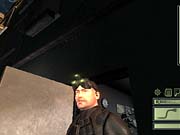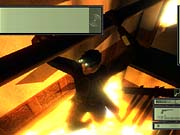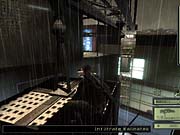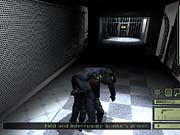Tom Clancy's Splinter Cell Q&A
Is Splinter Cell really the next Metal Gear Solid? We sit down with Ubi Soft producer Mathieu Ferland to find out.
See it in Action!
There's no greater thrill than snooping around places where you're not wanted, as can be attested to by the success of stealth-based action games like the Thief and Metal Gear Solid series. Ubi Soft is throwing its proverbial hat into the ring this November with the forthcoming release of Tom Clancy's Splinter Cell, a third-person action game that drips with hiding, sneaking, and infiltration. The game is so reliant on stealth, in fact, that the programmers at Ubi Soft Montreal had to develop brand-new lighting technology to piggyback on top of Splinter Cell's use of the Unreal engine. The game's use of shadows and real-time lighting, though certainly impressive, is intrinsic to the gameplay. Without it, Splinter Cell would never have come to fruition.
In the game, you'll assume the role of NSA field officer Sam Fisher, who's been tasked with single-handedly putting down an increasingly threatening regime in the ex-Soviet province of Georgia. Fisher will have a wide selection of high-tech gadgets and an assortment of acrobatic moves to keep him hidden from prying eyes while he accomplishes his mission. This will mark the first time in several years that a Clancy game hasn't been grounded in the traditional and realistic squad-based combat of Rainbow Six and Rogue Spear, though from what we've seen of the game so far, action game fans will undoubtedly appreciate this departure.
To learn more about the game, we recently sat down with Splinter Cell's producer, Mathieu Ferland.
GameSpot: Even at the time of the game's announcement, Splinter Cell looked very far along. How long have you been working on it?
Mathieu Ferland: It's been a little over two years now. We first focused on the heavy tweaking of the Unreal engine to allow for our light system, and on the game basis (animation, gameplay components, level design, and so on). The E3 build was looking good, but we knew it was nowhere near final. We were actually surprised by the enthusiasm that we saw at E3 because we knew that we had a lot of improvements in the works. We were a bit hard on ourselves--comparing the game with what we knew it could and would be, while the people at E3 were seeing it for the first time and were really blown away. Since we showed the game at E3, we have made improvements to the graphics, and in the last few months we've spent most of our time fine-tuning the gameplay, adding even more visual effects and optimizing the frame rate. We worked nights and days and weekends, but I think we finally arrived at the result we expected.

GS: Splinter Cell's plot concerns itself mainly with the rise of a rebel faction in the ex-Soviet state of Georgia, which is also the focus of Ghost Recon. Is there a reason why Clancy wants to focus gamers' attention on that part of the world?
MF: It's actually a coincidence, as both scripts were written separately by two different writers. I think that the "Soviet nostalgia" theme is pretty recurrent. If you look at the situation in Georgia right now, you will see that there is actually a lot of potential for trouble over there, and as the Clancy games are based on near-future believable adventure, it just makes sense.
But who knows who is really behind that rebel faction? Maybe you'll be surprised.
GS: The Ubi Soft Montreal studio has never really developed an action game of this type, or any kind of game with such stunning graphics, for that matter. Your previous games have been more lighthearted in nature. Why did you decide to make Splinter Cell?
MF: The challenge! Ubi Soft Montreal studios is now 5 years old. We have reached maturity and are able to handle much bigger projects, more effectively. It is true that we have never developed this type of game before, but the studio is full of very talented people who were waiting for the right project to show the full extent of their potential. Splinter Cell was this project, and a lot of love was put into it. I can tell you that the Montreal studio will keep surprising you in the future. Keep in mind that the next installment of Rainbow Six, Tom Clancy's Rainbow Six: Raven Shield, is also being developed in Montreal.
GS: Tom Clancy games have always been known for their realism. Why did you decide to stray from the tried-and-true formula of games like Rainbow Six and Ghost Recon?
MF: You said it. Clancy means realism, strong story lines, and excellence and offers you a total immersion. We never intended to focus only on squad-based games. And, it seemed appropriate to reinterpret stealth action through a hyper realistic point of view--it had never been done before, but if any franchise could make it happen, it was the Tom Clancy brand. Clancy games cover already SWAT teams and military groups, so special ops was the natural next step. In real life, operatives like Fisher work alone, so we needed to reflect that and adapt the gameplay to it. I think it offers a totally new experience in the Clancy world that a lot of people will really dig.

GS: Was Tom Clancy involved at all in the conceptual stages of Splinter Cell's development?
MF: Tom Clancy and his team are involved from the conception to the final product delivery.
GS: The lighting in the game is very impressive. Did you set out to develop the lighting technology strictly for Splinter Cell, or did the idea for the game coalesce after you developed the technology?
MF: The game concept came up first and then we built the technology for it. Since stealth is an important aspect of the game, we wanted Sam to be able to hide in the shadows and be exposed in light. It adds realism and tension to the game. It was a lot of work, but well worth it. We ended up delivering a game that looks like no other.
Welcome to the Party, Sam
GS: Splinter Cell is currently in development for the Xbox and the PC, though most of the screenshots and movies released so far have supposedly been from the Xbox version. Graphically, how do the two compare? Are there any other notable differences between Splinter Cell for the PC and Xbox?

MF: They will be really similar visually. We use different techniques on the Xbox and PC, but the final result will look almost identical. The main differences on the PC will be the controls with the keyboard and mouse and the screen definition, which is better than TV.
GS: Why did you decide to use Michael Ironside as the voice of Sam Fisher? Isn't Fisher supposed to be a bit younger than Ironside?
MF: He is, but if you listen to the voice of Sam in the game, no explanation is needed. Michael is a great actor and he did a wonderful job. He helps make Sam the cool, focused, and cold-blooded agent that he is. We wouldn't ask him to play Sam in a movie, but for the voice, he was perfect.
GS: Obviously, Splinter Cell borrows a lot of gameplay elements from the Metal Gear Solid and Thief series. Did you look to any other games for inspiration?
MF: We love stealth action games--who doesn't? So, being fans of the genre, we came up with our ideal stealth action game. Of course, we did look at what else was on the shelves and were inspired by many of them, but ultimately, when you play Splinter Cell, the experience is quite different from any other game. The multitude of moves that Sam can perform (like zip-lining, rappelling, and pipe-hanging) and his unique gadgets like the fiber-optic camera and thermal goggles make it a different experience. I think that, overall, it is the blending of all elements that will really set us apart--the way visuals, sounds, and gameplay come together is quite innovative.
GS: Speaking of which, what are you setting out to do with Splinter Cell that hasn't already been accomplished in those two games?
MF: I think we have a different approach to stealth action that is more realistic and will provide a different experience.
You have a real freedom of decision before tackling a challenge: play stealth or fight, use gadgets or not. There are a lot of possibilities every time, and there is never one correct solution. The blend between environment and gameplay, as I mentioned before, is a real strength of the game too. It really brings a high level of stress. And, you see a lot of different environments during the game, from the CIA headquarters to a presidential palace in Georgia.
If I had to sum it up in one term, I would say that immersion is what I like best about the game.
GS: Splinter Cell has a lot of nonlethal weapons, and in some areas, Fisher's mission will be over if he causes any fatalities. Are you making it possible for people to finish the game without killing anyone, like in Metal Gear Solid 2?
MF: If you are very skilled, you can get through almost the entire game without killing anyone. The last mission does require you to eliminate an opponent, however. We think that as they get more skilled, players will challenge themselves to play nonlethally.
GS: What was involved in developing the AI routines for the sentries in Splinter Cell? From what we've seen, guards will be tipped off after spotting you, or by some kind of loud noise. Can you go into more detail about their behavior?

MF: The AI reacts to Sam, of course, but also to any change of light or any sound in a given environment. If you throw a can near a guard, he will notice it, become more vigilant, and start investigating around. If you enter a room and switch off the light, the guard will try to reach the switch to find out what's happening. Also, most guards will call for help before fighting you. One of our concerns during the tweaking of the game is that sometimes the guards act too cleverly and are really hard to get a rid of if they outnumber you.
GS: We noticed that the game had an option to download additional content. How will Splinter Cell make use of Xbox Live? Will this feature be replicated on the PC version as well?
MF: Right now, this placeholder allows us the option of downloadable material in the future. However, we don't have anything planned right now. We will keep you posted.
GS: Are you still on schedule for releasing both versions of Splinter Cell this year?
MF: Yes, production is almost over. We are finishing the debugging. The Xbox version will ship on November 12, and the PC version a couple of weeks after.
GS: Sounds great, Mathieu. Thanks for your time.
Got a news tip or want to contact us directly? Email news@gamespot.com
Join the conversation